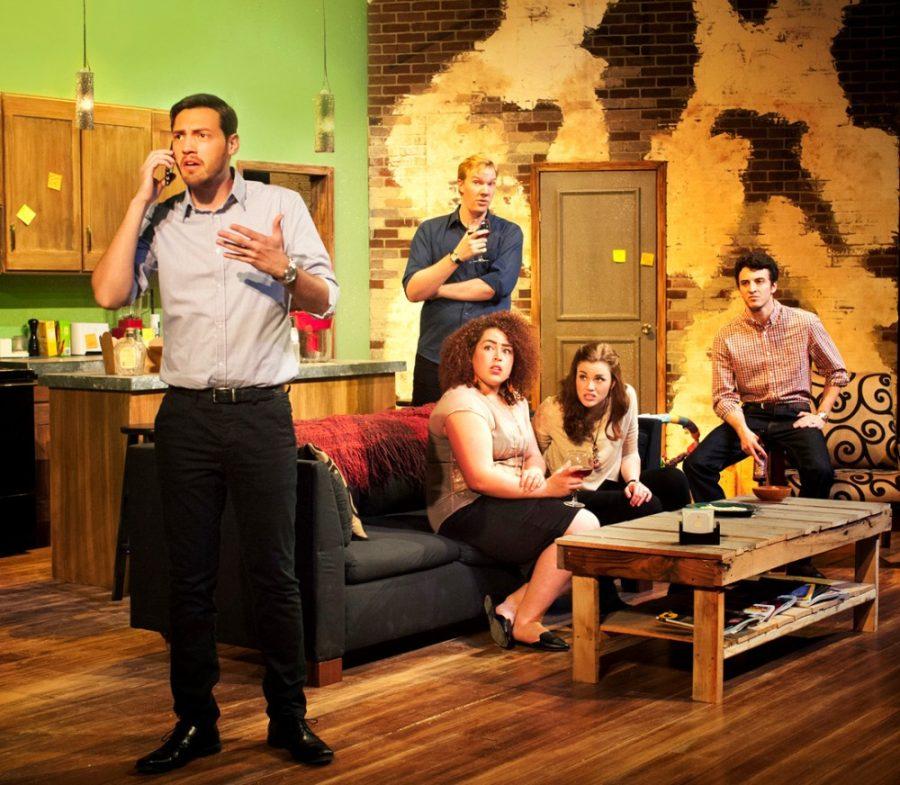Theater can be a masterful tool in examining human nature in all its raw, nuanced and universal parts in order to stir deeper reflection into what it means to be human.
In the wrong hands, a play endeavoring to tackle these themes with the intent to inspire change can crash, burn and cause the audience to fear for the future of mankind.
The Arizona Repertory Theatre’s production of Melissa James Gibson’s “This” attempts to examine the innate human selfishness that emerges when trauma and drama invade our personal lives.
The play opens with the recently widowed Jane (Heather Marie Cox) arguing about her disdain for games in her married friend’s apartment, which introduces the competing personalities that take center stage.
Marrell (Rhetta Kampel) and Tom (Zackry Colston) are new parents of a baby boy with an unfortunate sleep schedule that is segmented into 15-minute intervals. Understandable tension exists between the exhausted parents as they bicker in public.
Attempting to draw her best friend out of the guilt of grief, Marrell invites Jean-Pierre (Aaron Arseneault), an eligible “Doctors Without Borders” Frenchman whom Marrell described as not “someone who should be left unsexed.”
Gibson wrote Jean-Pierre as the expected stereotypical Frenchman, a beacon of the evolved man. Pompous and aloof, he smokes, wears black and believes humans should respond to any sexual craving they desire. His opinion and approval are frequently requested.
Jane leaves the game night early and returns home, and she is soon visited by Tom. Unhappy in his marriage, he confesses his passion for Jane. Jane, in her vulnerability, gives in to Tom’s declaration as the lights lower, and the two kiss.
Cox portrays Jane’s anxiety with slumped forward shoulders, shrill speech and a rhythm reflecting her love for the poetic styling of John Donne.
For an hour, inconsequential scenes without character development remove any curiosity as to when or if the affair will come to light. If the audience is meant to worry, Gibson shouldn’t have apathetically written that truly evolved men won’t feel threatened when their spouse pursues another.
Marrell’s jazzy nightclub singing, filled with lyrics expressing confusion over her failing marriage, is effective in conveying her internal struggle.
Alan (Micah Bond), friend to all, could have been a typical gay best friend stock role, but Bond transformed him into someone who should have his own spin-off production.
Bond’s effortless acting is a marvel and an excellent example of the Stanislavski system, in which actors draw inward to portray emotion honestly, on the stage. His presence is welcome, even though his storyline detracts from the bigger picture.
In the 11th hour, Marrell arranges to baptize her son when her agnostic husband is away. Jane and Alan waste time arguing the merits of which races, religions and cultures should monopolize certain behaviors.
The pleasant, early evening sunset shining through the apartment’s back window is the scene’s more plausible moment; it is also a generous metaphor to alert the audience the play is nearing its end. The trite dialogue used to vent Gibson’s own pet peeves suddenly gives way to Jane’s admission of her affair moments before Tom’s return.
Jean-Pierre prepares to take his leave amidst the mindless nitpicking, telling all the affair isn’t a big deal because the crisis in Africa is bigger. The comparison is a vain attempt to check many societal boxes in the guise of progressive insightful theater.
The final scene is similar to “Who’s Afraid of Virginia Woolf?” Jane is without answers, but she sees her need for change. Only 90 minutes in length, the lack of clarity was mind-boggling, striking out where “Who’s Afraid of Virginia Woolf?” succeeds — running nearly three hours, leaving the audience wiser and wanting more.
“This” runs until March 1 at the Marroney Theatre.
_______________
Follow Anna Mae Ludlum on Twitter.









